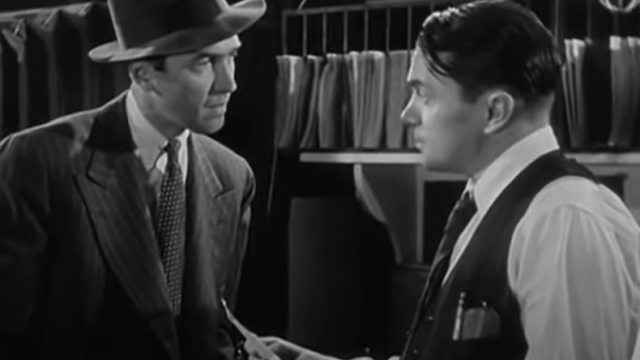It won’t entirely scratch your Noirvember itch–it’s a little too rational for that, and its cause is far too just–but Henry Hathaway’s Call Northside 777 is still a thoughtful, strangely riveting procedural thriller. It feels a little like a distant ancestor to Zodiac or Spotlight, with a careful focus on the minutiae of interviews, evidence-gathering, and combing through old files. Call Northside 777 allows that the human spirit may, from time to time, be honorable and even noble, but it has a healthy dose of earned cynicism about the way the world works. Stories drawn this closely from real life kind of have to.
Call Northside 777 gives us a quick primer on 1932 Chicago and the fact that, in the midst of all the rackets and murders, a policeman was killed in a speakeasy. The movie has essentially no interest in who killed him or why: it’s concerned exclusively with Frank Wiecek (Richard Conte), one of two more-or-less broke young Polish men convicted of the crime. Years later, Chicago Times reporter P.J. MacNeal (James Stewart) reluctantly investigates an ad placed in their classified section: $5000 for any information that could lead to Wiecek’s exoneration. At first, MacNeal sees no reason to question the received wisdom of Wiecek’s guilt, but he can’t help responding to the earnest, dogged devotion of Wiecek’s mother (Kasia Orzazewski), who placed the ad. Tillie Wiecek has spent years scrubbing floors in order to offer this reward money, and if no one comes forward, she’ll scrub floors until she can offer ten thousand. MacNeal’s editor (Lee J. Cobb) smells the kind of human interest story that can up their sales numbers, so he prods MacNeal into chasing down the various leads. Eventually, unsurprisingly, MacNeal becomes Wiecek’s champion in truth.
The actual arc of this wrongful conviction story isn’t too surprising, but the details are excellent. Hathaway is adept with both the granular details–a fuzzy photo enlargement sent by wire, the checking of a police log-book–and the large-scale social concerns–the current administration doesn’t want MacNeal’s reporting to rake up old sins that they might have to take the blame for, the police stonewall outsiders and practice routine corner-cutting to make their cases. The journalistic approach wisely leaves in a number of dead ends and unanswered questions, giving the story a more realistic texture. We can understand that it doesn’t matter whether the Wieceks were peeling dates or shelling walnuts the night of the murder; all that matters is the way that small difference in their accounts can be used against them. The only loose end that rankles is that of Wiecek’s supposed partner, Tomek Zaleska (George Tyne), who is presumably just as innocent but who doesn’t get lucky enough to have a newspaper campaigning on his behalf–and that, too, is essentially what happened.
The performances here are good–Jimmy Stewart gives a kind of genre-spanning performance as a hardboiled and somewhat lazy reporter who slowly becomes something downright Capraesque–but this isn’t a star-driven movie. It’s about annotations on a polygraph, the date (or lack thereof) on a photo, and the rules of eyewitness testimony. If that sounds dry, it will probably play that way for you, but if the dedicated investigative reporting of Spotlight thrilled you, this will too. It certainly flew by for me.
Call Northside 777 is streaming on the Criterion Channel.

